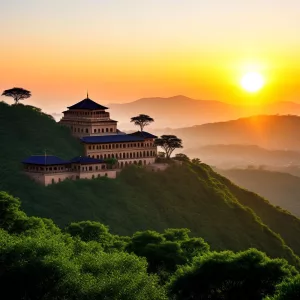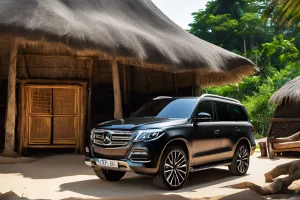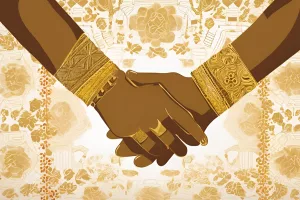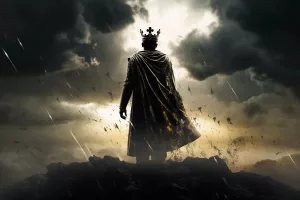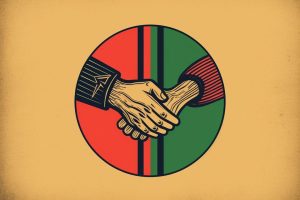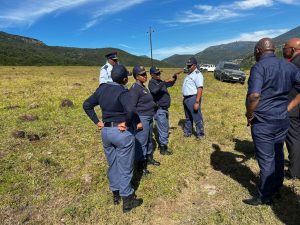A powerful African king, wearing leopard skin and cool Nike shoes, flew to Israel for a special visit. This surprise trip made waves, showing that South Africa’s international message isn’t just controlled by the government anymore. The king’s visit, with all its fancy tours and online buzz, has made people wonder who really speaks for South Africa on the world stage. It’s like a new story is being told, one where old traditions meet modernday politics.
Deputy President Paul Mashatile’s visit to the Amampondo AseNyandeni Kingship was a powerful moment of respect and partnership between traditional leaders and modern government. At the royal palace, they talked openly about real problems like water shortages, poor roads, and safety, promising to work together to fix them. Mashatile showed how traditions and government can join hands to bring services closer to the people and build stronger, safer communities. This visit wasn’t just a meeting it was a hopeful step toward a future where history and progress walk side by side.
In South Africa’s Free State, a big argument erupted when the government gave luxury cars worth R10 million to traditional leaders on Heritage Day. Many people are upset, saying this money would have been better spent on urgent community needs, especially since the province is struggling financially. Critics question whether these gifts truly help traditional leaders do their jobs or if they just highlight a disconnect between old customs and today’s challenges. This situation raises important questions about how society values tradition while trying to meet modern demands, all amidst a backdrop of financial stress and political debate.
South Africa recently saw a historic conversation between Deputy President Paul Mashatile and representatives from the National House of Traditional and KhoiSan Leaders, reflecting on three decades of South African democracy. The dialogue highlighted achievements and future aspirations, challenges and initiatives, and initiatives towards a prosperous future. The government is prioritizing capacitybuilding programs, empowering traditional leaders to contribute to societal change and tackling social issues like substance abuse, crime, GenderBased Violence, and Femicide.
The Thembu monarchy, based in South Africa’s Eastern Cape, is facing unsettling news as King Buyelekhaya Dalindyebo’s marital discord with Queen Khazeka Dalindyebo has caused concern. The queen has reportedly sought refuge from the king, and a troubling tweet alleging abuse has raised questions about the royal household’s stability. This incident adds to the ongoing conversation about traditional leadership’s role in modernday South Africa. People are eagerly waiting for updates and a satisfactory resolution that respects the country’s values of dignity and respect for all.
The legitimacy of King Misuzulu Ka Zwelithini’s recognition as the Zulu nation’s leader is being evaluated by the Pretoria High Court in a legal dispute over President Cyril Ramaphosa’s decision. The Zulu monarchy holds significant power in the KwaZuluNatal province, and the president’s role in acknowledging traditional leaders is crucial. The court’s ruling is expected to have ripple effects beyond the courtroom, potentially influencing traditional authorities’ governance and their relationship with the state. Meanwhile, public discourse and Twitter battles continue, underscoring the profound cultural significance of this issue.
The Commission for Gender Equality (CGE) and the Mpumalanga Provincial House of Traditional and KhoiSan Leaders (MPHTKL) signed a Memorandum of Understanding (MOU) in Nelspruit, marking a significant partnership for gender equality and cultural appreciation. ## The Importance of Cooperation
The uMkhanyakude District has been facing ongoing water challenges, prompting Minister of Water and Sanitation Senzo Mchunu to embark on a twoday visit to KwaHlabisa and Mtubatuba municipalities in KwaZuluNatal on May 11 and 12, 2023. The purpose of the visit is to provide comprehensive oversight of the refurbishment and upgrading of water supply schemes following the invocation of Section 63 of the Water Services Act, 108 of 1997, in February last year.
In May of 2023, Minister Senzo Mchunu of Water and Sanitation, along with Deputy Ministers David Mahlobo and Judith Tshabalala, conducted a crucial ministerial visit to the northern KwaZuluNatal district of uMkhanyakude. The purpose of this visit was to evaluate the progress made in refurbishing and upgrading the water supply schemes in KwaHlabisa and Mtubatuba Local Municipalities.
The situation in Majola villages of Port St Johns in the Eastern Cape has been dire for years. The village has experienced incidents of violence and crime that have resulted in the burning down of over 140 homesteads and houses and the killing of 22 people in the past three years alone. The conflict has displaced scores of families, leaving women and children destitute.


